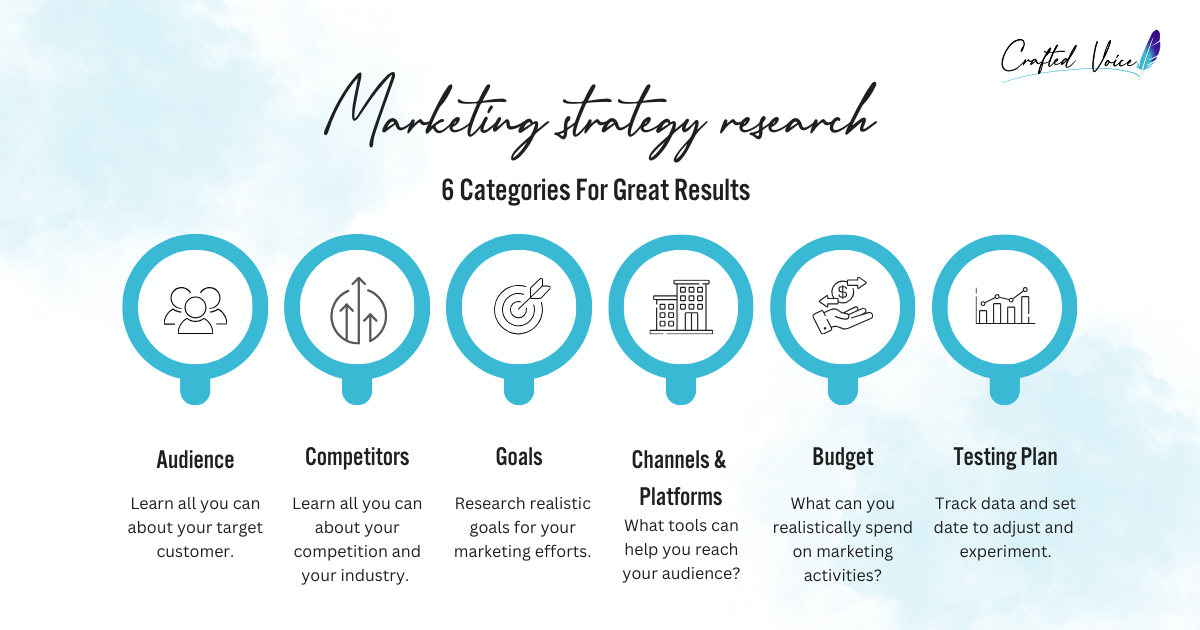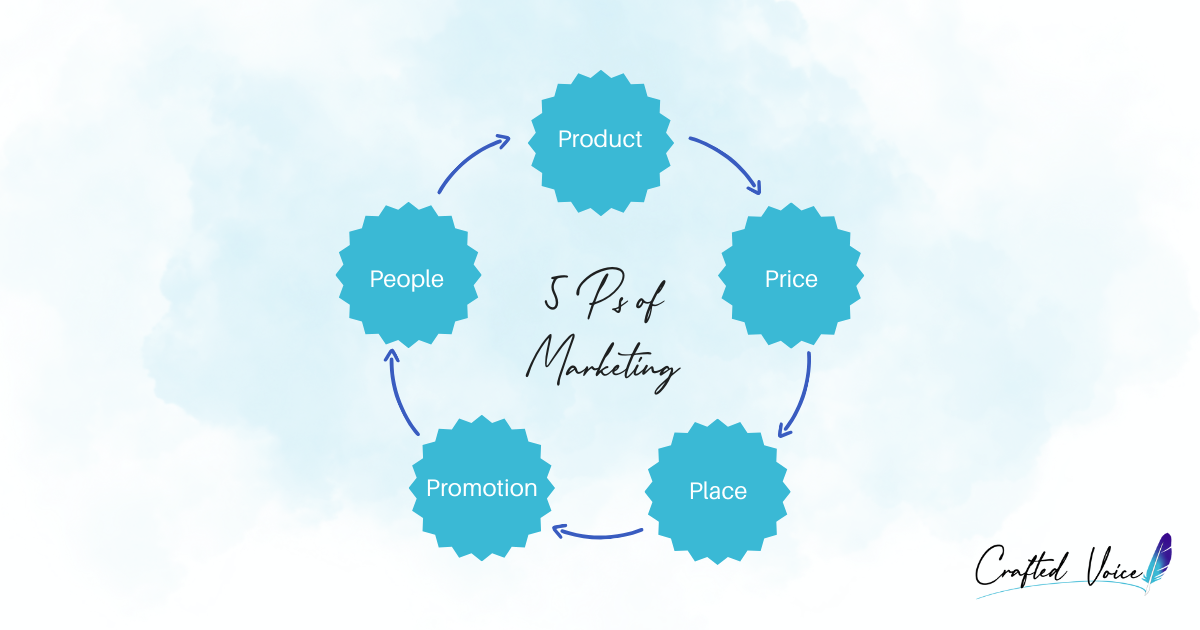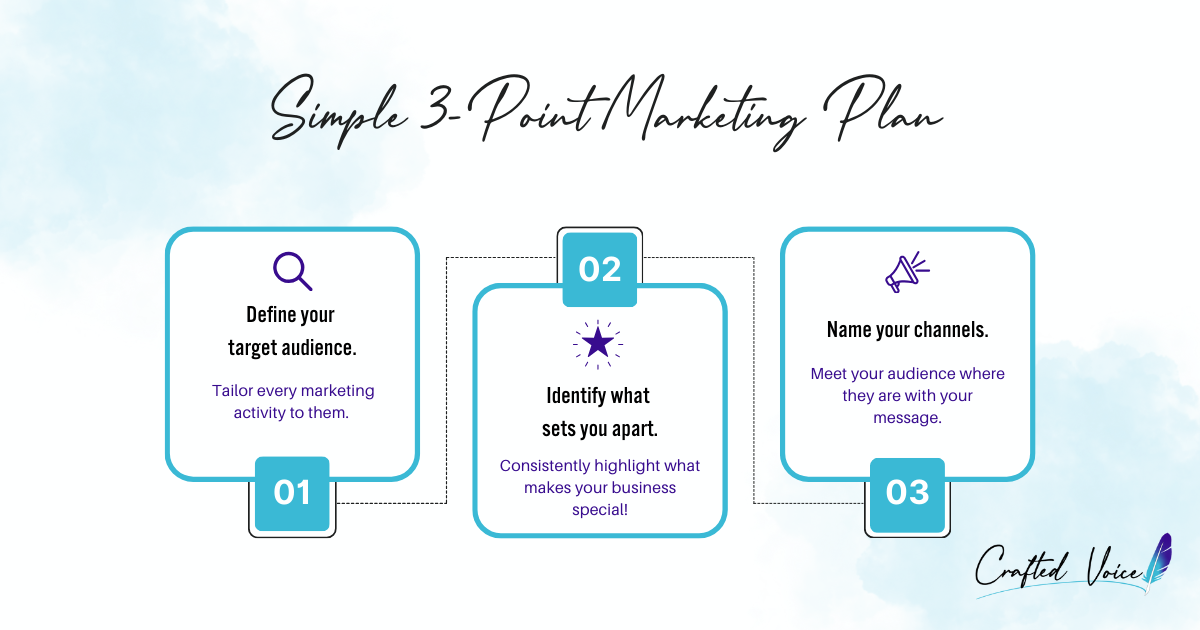Marketing Strategies For Small Business
What marketing strategies are best for your small business? Dive into practical tips and resources to guide your decision.
Owning a small business is exciting and rewarding, while also terrifying and stressful at times.
Choosing the right marketing for business owners is an important step toward building a healthy, profitable business.
What types of marketing are best for your small business in today’s rapidly changing world? Looking at business marketing strategy examples can help, but execution that speaks to the heart of your business is what matters. Let’s dive into some practical tips and resources to help you spread the word about your wonderful business and boost sales.

How do I market my small business like a pro?
If your business is a cake (hang with me here…), marketing can be one of two things: 1) an embarrassing, public stumble that leaves your cake smooshed on the floor, or 2) intricate and beautiful decoration on your cake that transforms it into an attractive showstopper.
While both cakes taste the same, no one is going to want to eat the cake off the floor. So how do ensure that your cake, eh… business, uses showstopping marketing and not sad, smooshed cake marketing?
- Do research on your ideal customer and competitors.
- Know the marketing basics.
- Put together a marketing plan.
- Consider a customized marketing mix.
- Study successful examples of marketing strategies for business.
- Use the right resources or hire the right people.
Below, you’ll find details on how to do each of these steps.
The best marketing strategies for small business are those that have a solid foundation (research, customer personas, brand voice guidelines, customer journey maps) and a tailored marketing plan that reaches their target audience in the right place at the right time. Get started on the right foot by enrolling in Crafted Voice’s on-demand e-course on developing data-driven customer personas. Contact us to learn more and enroll.
How do you research a marketing strategy?
Thought you were done with research papers when you graduated? Think again! The good news is that this research report has the potential to really boost your revenue if you invest time into doing it right. Researching a marketing strategy for your small business can be a pivotal step in ensuring its success.
When conducting your marketing strategy research, be sure to include the following categories:
- Audience: Start by understanding who your target customers are. What are their demographics, interests, and pain points? Conduct surveys, interviews, or use analytics tools to gather data.
- Competitors: Study your competitors to identify what marketing tactics they are using successfully. Look at their online presence, social media activity, and advertising strategies to gain insights.
- Goals: Determine what you want to achieve with your marketing efforts. Whether it’s increasing brand awareness, driving website traffic, or boosting sales, you want to establish specific, measurable goals.
- Channels & Platforms: Based on the results of your audience research, look into marketing channel options to reach your target customers. This could include social media, email marketing, content marketing, or paid advertising.
- Budget: Determine how much you can afford to spend on marketing and consider that against how much marketing will cost. Consider both the cost of the channels you’re using, any hired marketing help, and the potential return on investment.
- Testing Plan: Don’t be afraid to experiment with different marketing strategies to see what works best for your business. Document your launch date and when you’ll check in to see how things are going. You’ll want to track your results, analyze data, and make adjustments accordingly. Putting these elements on a calendar will hold you to it.

It’s important to realize that marketing trends and consumer behavior are constantly evolving. Stay up-to-date with industry news, attend workshops or webinars, and seek advice from marketing experts to refine your strategy over time. This initial document can serve as an anchor, but it’s not set in stone. Keep refining your approach based on data and insights and you’ll develop a marketing strategy that effectively promotes your small business and drives sales.
What are the 5 Ps of market strategy?

After you’ve done your research, you’ll want to put together a marketing plan. One of the go-to strategies in the marketing world is the 5 Ps: Product, Price, Place, Promotion, and People. This offers a great place to start for business owners who don’t have extensive marketing experience. Click on each of the tabs below to learn more about each “P.” If you are looking for an easy way to focus your marketing efforts, the 5Ps are a great place to start.
This is your main reason for business, whether it’s a tangible thing like a gadget or a service like coaching. It’s all about what you’re offering and what makes it stand out, like its cool features, top-notch quality, or sleek design.
Finding the right price tag is like Goldilocks: Too cheap and you aren’t making the money you need to stay in business; too expensive and your customers will turn to a competitor; just right and you’re in business!
Real Estate and vacations aren’t the only industries that are all about location, location, location. Are you showing up as a business in all the right spots? You want to make it as easy as possible for your target audience to find you, so meet them where they are.
Probably the most obvious of the 5 Ps is promotion. That’s what marketing is all about right? Ads, blogs, flyers, social media…it’s all about telling your story and promoting your product or service.
Without people (both customers and employees), your business doesn’t exist. Keep them smiling and your business will reap the rewards. Happy customers spread the word about your business, and happy employees keep the gears turning smoothly.
What is a marketing mix strategy for small business?
To take the 5 Ps a step further, a marketing mix strategy involves blending the right combination of product, price, place, promotion, and people to effectively reach and engage your customers.
For a small business, this means intentionally tailoring each marketing activity to fit within your budget and align with your business goals. This begins with developing customer personas that serve as the north star for everything you do. Crafted Voice offers an on-demand e-course on developing data-driven customer personas. Contact us to learn more and enroll.
By strategically managing the marketing mix, you can maximize your limited resources, differentiate yourself from your competitors, and create a booming business!
What does a marketing plan include?
A professional marketing plan serves as a roadmap to reach your business goals. At Crafted Voice, we include 5 elements into the marketing plans we create for our clients. These include:
- Setting your Customer Personas as your North Star.
- Establishing Brand Voice Guidelines to serve as anchor language for all marketing messaging.
- Conducting thorough competitor analysis and target audience research to acknowledge your accurate position in the market, and locate your customers (so you know where to find them!).
- Chart Customer Journey Maps to pinpoint all customer touchpoints and messaging opportunities.
- Draft an Editorial Calendar to put organization and flow between marketing campaigns.
By including all these components in your marketing plan, you establish foundational processes and resources that will direct your communications efforts and balance communications best practices with customized support to develop the perfect strategy for your business. This is not a cookie cutter approach!
What is a 3 point marketing plan?
Many small businesses owners are so strapped for time that they just need a short checklist to help fit marketing on their overflowing plates. If this is you, here is a 3 point marketing plan to consolidate the most essential elements:
- Define Your Target Audience. Clearly define your target audiences demographics, pain points, needs, preferences, motivations, and buying habits. Then, tailor every marketing activity to them.
- Identify Your Differentiation. Identify what sets your business apart from competitors and make this clear and known to your target audience. This could be exceptional quality, innovative features, or outstanding customer service. Whatever it is, consistently highlight what makes your business special!
- Name Your Channels. Meet your target audience where they are. This could include a mix of digital marketing (such as social media, email, and content marketing) and traditional methods (such as print advertising or networking events).

Easy peasy right? If you are still feeling a bit overwhelmed, the team at Crafted Voice would love to help. Browse our shoulder-to-shoulder and concierge communications services to see how we can help.
What are the 5 marketing strategies to promote business?
While there are many more than 5 ways to promote your business, here are 5 popular marketing strategies for small business that you should consider when developing your marketing plan:
Content Marketing – Content marketing involves creating and distributing valuable, relevant content to engage your target audience. It builds brand awareness, establishes credibility, and ultimately drives customers to take action through informative articles, videos, infographics, and other formats.
Social Media Marketing – Perhaps the most obvious marketing strategy in today’s age is social media marketing, which leverages social media platforms to connect with your target audience, build brand awareness, and drive website traffic and sales. Social media marketers create and share content, engaging with followers, running targeted ads, and analyzing metrics to optimize performance.
Affiliate Marketing – Think of affiliate marketing as referral or word-of-mouth marketing. It’s a performance-based marketing strategy where businesses reward affiliates for promoting their products or services and driving conversions. Affiliates earn a commission for each sale, lead, or click generated through their marketing efforts, incentivizing them to promote the brand to their own connections.
SEO Marketing – SEO stands for Search Engine Optimization and is a marketing strategy that involves optimizing a website to improve its visibility and ranking in search engine results pages (SERPs). It often goes hand-in-hand with content marketing. Keyword research, on-page and technical optimization, and link building are all efforts under this strategy used to attract organic traffic and increase online visibility.
SMS Marketing – SMS, or Short Message Service, marketing involves sending targeted text messages to customers’ mobile phones to promote products, services, or events. It’s a direct and immediate communication channel that can be used for sending promotions, discounts, reminders, and personalized offers to engage customers and drive conversions. This is a great strategy if your target customers prefer to be texted instead of called on the phone or emailed.
What are the examples of online marketing strategies?
While the section above provides you with a good overview of the 5 most popular marketing strategies, here are a few additional marketing strategy examples:
- Pay-Per-Click (PPC) Advertising runs paid advertising campaigns on search engines, social media platforms , and other websites to drive traffic to your website, generate leads, and increase sales through targeted ads.
- Influencer Marketing involves collaborating with influencers or content creators with a large following in your niche to promote your products or services to their audience, leveraging their credibility and reach to drive brand awareness and sales.
- Online PR and Outreach builds relationships with online publications, bloggers, influencers, and journalists to earn media coverage, backlinks, and mentions that can boost brand visibility and credibility.
- Retargeting and Remarketing focuses on users who have previously visited your website or interacted with your brand online using personalized ads to re-engage them, encourage return visits, and drive conversions.
- Repurpose Marketing involves identifying evergreen marketing materials and messages that can be reused over and over again to achieve a higher return on investment.
These online marketing strategies for small business can be successful if you are set up with a solid communication strategy from the beginning, with your target audience directing each decision you make about which marketing efforts to invest in.
Don’t Suffer Because of Poor Marketing
Small business ownership is an amazing experience and your marketing should reflect how truly incredible your business is because of the solution that is provides to your target audience. Choosing the right marketing strategies can make the difference between your business looking like a smooshed cake dropped on the floor or an attractive showstopper cake that draws well deserved attention and praise.
From content marketing to social media strategies and beyond— your target audience should serve as your north star, guiding your decisions when crafting a solid marketing plan. You could have the best product, offer the best services, or have the best mission of any business in the whole world, but if you aren’t telling the right people, at the right place, at the right time, no one will ever know (or care).
Don’t let your business suffer because of poor marketing. Crafted Voice Communications is here to serve small business owners in the way that makes sense for their business goals and budget. We offer DIY resources, shoulder-to-shoulder, do-it-with-you services, as well as concierge do-it-for-you services.
Do-It-Yourself
Receive templates and checklists for SEO, blog structure, lead magnets, landing pages, and more. We provide you with tools and resources to get you started, and you take it from there.
Shoulder-to-Shoulder
We serve as a consultant to support you as we do the work together. An example might be the website since you’re already working on a revamp – you do the work and we can serve as your second set of eyes for things like user experience, SEO, etc.
Concierge
We do all of the work, and you simply edit/approve before the elements go live. This is a great option if you simply don’t have the time to invest in executing your communications strategy to its fullest potential.
Secure A Marketing Partner That Works For You
Schedule a free consultation to discover how we can help you create showstopping marketing!
Reach Us
We’re proud to serve business owners where we call home in the greater Columbus, Ohio metropolitan area. We also serve clients from coast-to-coast.
Together, let’s craft your story and captivate your audience!
Hilliard, Ohio
